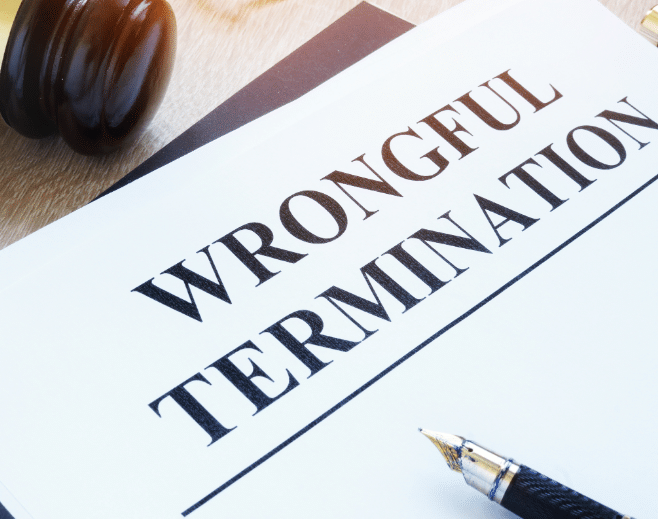
The Fee Is Free Unless You Win.
Top Rated Employment Law Firm
Protecting Families Since 1995
$450 Million Won
TABLE OF CONTENTS
Wrongful termination occurs when you are fired from your job as a result of retaliation or discrimination. As an employee, you should try to work hard and do the best job you possibly can. When you maintain this work ethic, you should be able to enjoy a long, prosperous career unless you are the victim of wrongful termination.
Wrongful termination can occur in any occupation and to any employee. You can get fired from work because you are a member of a protected class. You can get fired because you spoke out against discrimination or sexual harassment in the workplace. Whether used as a form of retaliation or another way to discriminate, wrongful termination violates employment laws and your right to work.
As the victim of wrongful termination, you deserve an attorney that will help you stand up against your employer. Your lawyer should advocate for your rights to work, regardless of your protected class. They should advocate for you regardless of your choice to speak up against discrimination and harassment.
Wrongful termination is related to discrimination and harassment in the workplace. You may have a claim for wrongful termination if an employer, CEO, supervisor, or manager fires you due to issues relating to membership in a protected class.
Protected classes include:

Wrongful termination can also be a form of retaliation. You complain to HR about discrimination or sexual harassment and are fired from work. As a result, you may have a claim for wrongful termination.
Employees can also experience wrongful termination when using Family and Medical Leave Act leave as provided by law. You may receive a call, email, text, or letter informing you that you are not returning to work and being fired or laid off. If no one else in your department received the same termination notice, you might have a claim for wrongful termination.
Retaliation can also occur if an employer is a whistleblower. Whistleblowers report illegal activity to the government or other governing agencies. If a whistleblower is then fired in retaliation for reporting the information, they may have a claim for wrongful termination.
To learn more about your rights regarding wrongful termination, contact a dedicated employment discrimination attorney.
Some examples of wrongful termination may include, but are not limited to:
Most states are at-will employment states. At-will employment means that an employer can fire you for any reason, except a reason based on discrimination or retaliation. At-will employment means your boss can fire you because he just doesn’t like you. He can fire you for wearing pink too often.
Your boss can fire you for any reason that does not include any protected classes. Protected class members cannot get fired simply because they are a protected class member. If you can prove that your employer’s provided reason or actual reason for termination is related to protected class status, you may have a case for wrongful termination.
At-will employment does not protect employers from firing employees in retaliation either. Any employer that terminates an employee to get back at them for an action is breaking the law.
If you are the victim of wrongful termination, you may choose to file a claim with the Equal Employment Opportunity Commission (EEOC). If the EEOC determines your claim fits the criteria for wrongful termination, you will receive a Right to Sue Letter to file a lawsuit in federal court.
Sometimes, you can file a wrongful termination claim directly with the federal court. When wrongful termination relates to FMLA leave, the Equal Pay Act, or employee rights not governed by the EEOC, you may file your claim directly with the federal court.
You may choose, instead, to file a claim under your state’s employment discrimination laws. Some states offer better remedies or allow employees to file claims if they work for companies with fewer than 15 employees.
You may also choose to file a wrongful termination claim under whistleblower protection laws. These laws protect employees who are reporting employer illegal activities and fired from work as a result.
Once you file the claim, the courts may offer the following compensations for your winning claim. Some relief may include the following:
Discover how our expertise has helped clients overcome their legal challenges and achieve successful outcomes.
View All TestimonialsOlivia is the best! Oliva was very thorough, patient, and very detailed and descriptive regarding the process. She was very supportive of my sexual harassment case. From the very beginning, she communicated and would provide me with any updates and she was always available when I needed anything. More importantly, she always extended that comfort level of trust which always made me feel at peac... Read Full Testimonial
Casey Barkhordarian is a fabulous attorney to work with. He explained everything to me about the case (including the millions of questions I asked) right from the start of our very first meeting. He did so in a way that I could understand and was very prompt and clear with communication the entire time. Casey Barkhordarian is a very competent and knowledgeable lawyer to have on your team. I def... Read Full Testimonial
Matt Finkleberg is by far the best attorney I’ve ever hired! From the outset, it was evident that he was not just another lawyer; Matt is nothing short of extraordinary. He possesses the ability to do his job phenomenally while somehow managing to give me hope during one of my darkest of hours. Matt consistently returned my calls promptly, regardless of my questions, confusion, or self-doubt ... Read Full Testimonial
I cannot speak highly enough about my experience working with Matt Finkelberg. From the very beginning, Matt approached my case with an incredible level of professionalism, knowledge, and dedication that immediately put me at ease. It is rare to find an attorney who not only possesses an impressive depth of legal expertise but who also truly cares about the well-being and best interests of thei... Read Full Testimonial
Olivia is absolutely outstanding! She understands the emotional side of your case while being able to find the legal aspects of holding the employer accountable for breaking the law! Made a really terrible situation a little easier by explaining everything and helping me get everything in order and in the right hands. I would not use anyone else! Call them for any sexual harassment case... You ... Read Full Testimonial
This law firm is absolutely amazing!!! They went so above and beyond for me!!! I am so grateful for all their help with my difficult case!!! If you need a lawyer, you will be in great hands with their firm!!! And wait until you see the office! The building is so high tech I couldn't figure out how to get in the elevator lol!
It was a pleasure to have Casey represent and help me for my employment case. It was my first time needing an attorney, so I was a bit apprehensive at first – Casey took the time to answer all of my questions and fully explain everything to me, which really put me at ease. He was very attentive, supportive, and knowledgeable throughout the whole process – Casey would ask questions to ensure... Read Full Testimonial
matt is an excellent attorney. he handled my case with the utmost care and highly exceeded all expectations. i could not recommend derek smith and esp. matt finkelberg enough
matt is an excellent attorney. he handled my case with the utmost care and highly exceeded all expectations. i could not recommend derek smith and esp. matt finkelberg enough 🙂
Matt handled a suit against the City of LA and members of the a Neighborhood Council for racial discrimination and harassment. Ths was the first suit of this type filed on a Neighborhood Council Matt handled it with poise and above all professionalism. He walked me through the 3 year process and above all provided moral support and encouragement as I still experienced racism and harassment duri... Read Full Testimonial
Matt Finkelberg is Amazing and Devotional! It was a pleasure to have Matt represent me for my employment case. He was very attentive, supportive, and knowledgable throughout the whole process. Whenever I reached out he responded promptly which I greatly appreciated. Matt fought diligently and hard throughout my case to make sure my case was represented best. Thank you again Matt for everything.... Read Full Testimonial
It was a pleasure to have Casey represent and help me for my employment case. It was my first time needing an attorney, so I was a bit apprehensive at first – Casey took the time to answer all of my questions and fully explain everything to me, which really put me at ease. He was very attentive, supportive, and knowledgeable throughout the whole process – Casey would ask questions to ensure... Read Full Testimonial
Our dedicated attorneys are ready to fight for your workplace rights and ensure justice!
Wrongful termination can be devastating. You must figure out how to provide for your family when the unexpected suddenly occurs. The last thing you need to worry about is filing a lawsuit against your employer. However, it may be the answer to all your financial problems.
A dedicated discrimination and harassment lawyer can help you fight for your rights so you can focus on finding a new job and supporting your family. They can help you negotiate a settlement early in the process to make it as easy as possible for you to move on.
However, if your employer refuses to negotiate a fair settlement, your attorney will stand by your side and help you stand up for your rights. They can attempt to negotiate with your employer all along the way. In the meantime, they can ensure you meet all required court deadlines. They will file each answer, schedule each deposition, and stand by your side as your advocate from the moment they file your initial charge.
If you work hard and do your job, you should trust you will have a job for as long as you want it. However, some employers have other intentions. If you are the victim of wrongful termination in the workplace, the experienced employment discrimination attorneys at the Derek Smith Law Group can help.
Were You the Victim of Wrongful Termination Due to Retaliation, Discrimination, or Whistleblower Claims? Do You Want to Know More About Your Rights? Please Call 800.807.2209 or email derek@dereksmithlaw.com for More Information.

Our experienced legal team provides reliable services in key U.S. cities, ensuring expert assistance for workplace discrimination and employment law matters wherever you are located.
Our experienced employment lawyers are dedicated to resolving your workplace rights concerns with expertise and care.